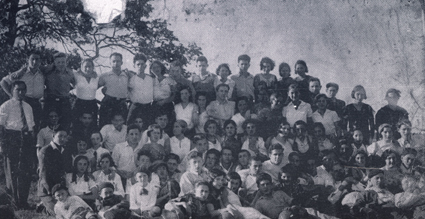Ruvim Beitler and his friends on the meeting of the Jewish community in Zagare
This is the meeting of the Jewish community in Zagare in 1930s. Here us the youth of the town. The third to the left in the bottom row is father's sister Liba Beitler, father's brouther Ruvim Beitler is the third in the top row. I do not remember the rest, though at that time I knew almost all of them. Most of those people had not survived the war.
I was born in a Lithuanian town Zagare [about 250 km to the North from Vilnius]. It was a small town bordering on Latvia, with the population of about 5 thousand people. In my childhood, half of town's population were Jews. There were rich, middle-class and poor people. I do not remember any indigent among the Jews in prewar Zagare. All Jewish stores were mostly concentrated in the heart of the town. There were aisles of redbrick houses, where the stores were open. I remember agri store, carrying mostly hardware. There were also manufacture stores and bakeries. There was another hotel in front of Broide's inn. It was owned by a Jew Krits. One of the best apothecaries was in the building of his hotel. Thought, the drugstore was owned by a Lithuanian. There were a lot of photographers in our town. One of the best ones was a Lithuanian. The most famous people of the town were photographed by him. Most of the Jews were workers and craftsmen. There was flax processing factory in town. Some of the craftsmen processed wool there was mill at Svete river. It belonged to the Shruls brothers. They also built a dam, owing to which there was an electricity in town. There two synagogues in Zagare - Nae Zagare ("the New") and Alt Zagare ("the Old"). Alt Zagare were pretty old buildings. They were not acting and gradually got dilapidated. Nae Zagare also were comprised of two buildings- one a daily one and another nice ceremonious looking two-storied building, where people most went on holidays. There was a rabbi in Zagare. His name was Riv. He was a very respectable man. Not only Jews sought his advice, but Lithuanians as well.
My grandmother Mina gave birth to 11 children, out of whom 9 grew up and two died in infancy. Children were born almost every year. When grandpa was alive the family scraped through somehow. When he died in 1930, grandma had to earn for a living. She started selling fish. She and her sons Ruvim and my father Leibl went to Klaipeda, Latvia to buy fish and sell it afterwards on our market. When she ran out of money, she borrowed it from people and paid back after her next trip.
Ruvim was born in 1914. He was a simple man, always doing the jobs that other people were not willing to. He was a stevedore, a janitor, a cobbler etc. During Great Patriotic War he was in evacuation with grandmother's family. When he came back in Lithuania, he married Jewish Pole Lyuba, who came back from Dachau. Ruvim and Lyuba had a son Isaac. He is currently living in Israel with his family 7. He died six years ago, several month before his wife's death.
Father's sister Liba, born in 1915, was actually the homemaker. Grandmother was trying to earn money to provide for the family and Liba did all the work about the house, looked after younger kids, cooked food, did the laundry and other things the homemaker was supposed to do. In 1938 she married a barber Abramovich and gave birth to son Yankle. She was in evacuation with him, and her husband was killed in action. After war Liba got married again. She bore two more sons from her second husband Leibovich. Lib died in late 1990s and her son Yankle is living in Vilnius. One of her younger sons leaved for Israel in the 1990s.
